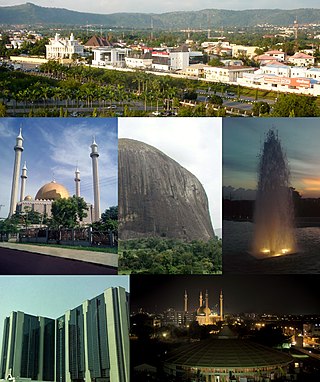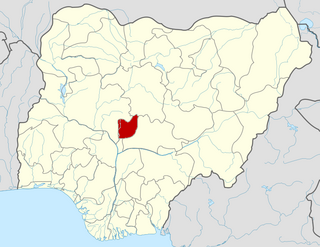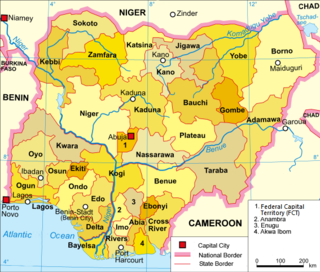Related Research Articles

Abuja is the capital and eighth most populous city of Nigeria. Situated at the centre of the country within the Federal Capital Territory (FCT), it is a planned city built mainly in the 1980s based on a master plan by International Planning Associates (IPA), a consortium of three American planning and architecture firms made up of Wallace, Roberts, McHarg & Todd as the lead, Archi systems International, and Planning Research Corporation. The Central Business District of Abuja was designed by Japanese architect Kenzo Tange. It replaced Lagos, the country's most populous city, as the capital on 12 December 1991.
A federal district is a type of administrative division of a federation, usually under the direct control of a federal government and organized sometimes with a single municipal body. Federal districts often include capital districts, and they exist in various federations worldwide.

Nigeria is a federation of 36 states. Each of the 36 states is a semi-autonomous political unit that shares powers with the federal government as enumerated under the Constitution of the Federal Republic of Nigeria. The Federal Capital Territory (FCT), is the capital territory of Nigeria, and it is in this territory that the capital city of Abuja is located. The FCT is not a state. It is a territory of the Federal Government, administered by Ministers of Government appointed by the President who supervises by the administration of the territory. Each state is subdivided into local government areas (LGAs). There are 774 local governments in Nigeria. Under the constitution, the 36 states are co-equal but not supreme because sovereignty resides with the federal government. The constitution can be amended by the National Assembly, but each amendment must be ratified by two-thirds of the 36 states of the federation.

Kogi State is a state in the North Central region of Nigeria, bordered to the west by the states of Ekiti and Kwara, to the north by the Federal Capital Territory, to the northeast by Nasarawa State, to the northwest by Niger State, to the southwest by the Edo and Ondo states, to the southeast by the states of Anambra and Enugu, and to the east by Benue State. It is the only state in Nigeria to border ten other states. Named for the Hausa word for river (Kogi). Kogi State was formed from parts of Benue State, Niger State, and Kwara State on 27 August 1991. The state is nicknamed the "Confluence State" due to the fact that the confluence of the River Niger and the River Benue occurs next to its capital, Lokoja.

The president of the Federal Republic of Nigeria is the head of state and head of government of the Federal Republic of Nigeria. The president directs the executive branch of the federal government and is the commander-in-chief of the Nigerian Armed Forces.
ISO 3166-2:NG is the entry for Nigeria in ISO 3166-2, part of the ISO 3166 standard published by the International Organization for Standardization (ISO), which defines codes for the names of the principal subdivisions of all countries coded in ISO 3166-1.
A federal capital is a political entity, often a municipality or capital city, that serves as the seat of the federal government. A federal capital is typically a city that physically encompasses the offices and meeting places of its respective government, where its location and relationship to subnational states are fixed by law or federal constitution. Federal capitals may or may not be considered states in themselves, and either exercise significant political autonomy from the federation or are directly ruled by the national government located within their premises, as federal districts.

The Federal Capital Territory (FCT) is a federal territory in central Nigeria. Abuja, the capital city of Nigeria, is located in this territory. The FCT was formed in 1976 from parts of the states of old Kaduna, Kwara, Niger, and Plateau states, with the bulk of land mass carved out of Niger state. The Federal Capital Territory is within the North Central region of the country. Unlike other states of Nigeria, which are headed by elected Governors, it is administered by the Federal Capital Territory Administration, headed by a minister, who is appointed by the president.
A capital district, capital region, or capital territory is normally a specially designated administrative division where a country's seat of government is located. As such, in a federal model of government, no state or territory has any political or economic advantage relative to the others because of the national capital lying within its borders. A capital territory can be a specific form of federal district.

Nasarawa State is a state in the North Central region of Nigeria, bordered to the east by the states of Taraba and Plateau, to the north by Kaduna State, to the south by the states of Benue and Kogi, and to the west by the Federal Capital Territory. Named for the historic Nasarawa Emirate, the state was formed from the west of Plateau State on 1 October 1996. The state has thirteen local government areas and its capital is Lafia, located in the east of the state, while a key economic centre of the state is the Karu Urban Area—suburbs of Abuja—along the western border with the FCT.

The Senate is the upper chamber of Nigeria's bicameral legislature, the National Assembly. The National Assembly is the nation's legislature and has the power to make laws, as summarized in chapter one, section four of the 1999 Constitution of Nigeria. The lower chamber is the House of Representatives.

The House of Representatives is the lower chamber of Nigeria's bicameral National Assembly. The Senate is the upper chamber.

Federal Republic of Nigeria – sovereign country located in West Africa. Nigeria is a federal constitutional republic comprising thirty-six states and one Federal Capital Territory. Nigeria borders the Republic of Benin in the west, Chad and Cameroon in the east, and Niger in the north. Its coast lies on the Gulf of Guinea, part of the Atlantic Ocean, in the south. The capital of Nigeria is Abuja.

Nigeria is a federation of thirty-six states and one Federal Capital Territory, which are divided into 774 Local Government Areas (LGAs) in total.
The Federal Capital Territory Administration (FCTA) is a Nigerian ministry that administers the Federal Capital Territory of Nigeria. It is headed by a Minister appointed by the President, assisted by a Permanent Secretary, who is a career civil servant.

A territory is an area of land, sea, or space, belonging or connected to a particular country, person, or animal.

Lists of villages in Nigeria organised by state:
References
- "Nigerian Federal States". WorldStatesmen. Retrieved 2009-11-30.
Chigudu Theophilus Tanko: A historical study of the emergence of FCT in Nigeria